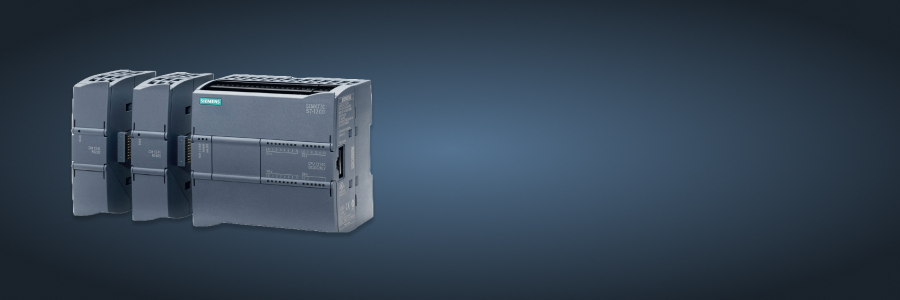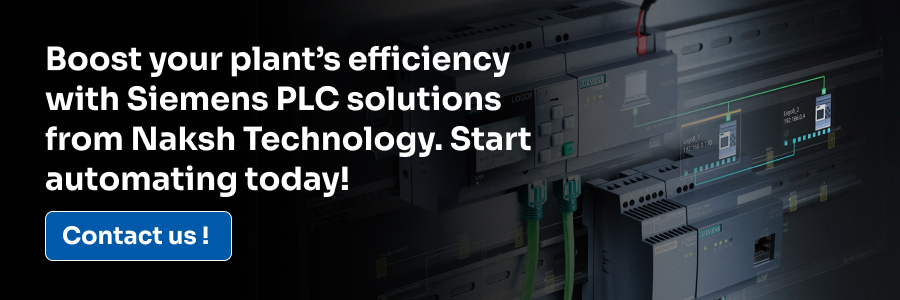Automation drives the heartbeat of modern packaging and textile plants, and Siemens PLC solutions power such operations with precision efficiency. Herein we explain why PLC Siemens systems like the SIMATIC S7 series are suitable for these industries. We’ll explain the benefits from increased productivity to reduced energy consumption and show you how Naksh Technology Solutions LLP provides customised Siemens PLC controller Solutions. Ready to reinvent your operation? Let’s get started!
Quick Facts: Siemens PLC for Packaging and Textile Plants
- What is Siemens PLC? A Programmable logic controller for packaging/textile production.
- Key Models: S7-1200 (small setups), S7-1500 (complex systems), S7-300/400 (legacy plants).
- Benefits: Enhance productivity by up to 20%, energy savings by 15% and waste reduction by 10%.
- Industries Served: Packaging (Bottling, labeling), textiles (Weaving, dyeing).
- Why Naksh? As a Siemens motor dealer in Ahmedabad, we offer expert consultation and fast delivery.
What Challenges Do Packaging and Textile Plants Face?
Packaging and textile plants want high output with little waste but manual systems fail. Slow processes, errors and high energy consumption drive up costs. With Siemens PLC these problems are solved precisely!
- Packaging Challenges: Uneven filling, slow labeling and conveyor jams reduce efficiency. A PLC controller synchronises lines for 1000 + bottles/minute.
- Textile Challenges: Unequal yarn tension or dyeing mistakes are waste materials. PLC Siemens ensures consistent quality in looms and dyeing units.
Automation is the solution, and Siemens provides reliable, scalable control.
Learn more, The Impact of Siemens PLC on Mining and Heavy Equipment
What is a Siemens PLC and How Does It Work?
Siemens PLC (Programmable Logic Controller) processes industrial inputs such as sensor data and outputs such as motors or valves. Siemens ‘SIMATIC family includes the S7-1200 and S7-1500 – versatile and robust. And here’s why it changes everything for packaging and textile plants:
Key Features
- Modular Design: Add or remove modules according to changing requirements – from small packaging machines to large textile plants.
- Fast Processing: Fast data handling allows real-time control when high-speed labeling or weaving is required.
- TIA Portal: Totally Integrated Automation Portal simplifies programming/diagnostics, and setup time is reduced by up to 30%.
- Connectivity: SUPPORTS PROFINET and Ethernet/IP in combination with Siemens SCADA, drives and cloud platforms.
Packaging Automation: Benefits of Siemens PLC
Packaging plants thrive on speed and precision. A Siemens plc controller delivers equally, changing operations in tactics that save time and money.
- Increased Productivity: PLC Siemens systems automate repetitive tasks such as filling, capping, & labeling. For instance, in a pharmaceutical packaging line, a SIMATIC S7 1200 can deal with bottle orientation and also labeling with pinpoint accuracy, boosting output by as much as twenty %.
- Reduced Downtime: Advanced diagnostics in PLC units, such as the S7 1500, catch problems before they halt production. Built-in tools alert operators to faults, such for instance a jammed conveyor, reducing expensive interruptions.
- Energy Efficiency: By optimizing motor speeds and process timing, Siemens plc controller systems bring down energy consumption. A packaging plant with a SIMATIC S7 1200 for conveyor control is able to cut energy bills by fifteen % through accurate load control.
- Quality Assurance: Consistent output is crucial in packaging. PLC Siemens guarantees consistent filling quantities and secure sealing, minimizing defects.
Explore our detailed post on Siemens PLC: Benefits of Using it in Industrial Automation
Textile Automation: Benefits of Siemens PLC
Textile plants demand precision to keep up fabric quality and lower material waste. Siemens PLC solutions excel here, offering customized control for complicated processes.
- Precision Control: PLC controller methods, such as the S7 1500, control speed and tension in spinning or perhaps weaving machines. This guarantees constant yarn thickness, cutting waste by as much as ten % in textile mills.
- Scalability: From little dyeing devices to huge weaving factories, PLC Siemens scales effortlessly. The modular S7 300, still utilized in numerous textile plants, adapts to developing production needs with no major overhauls.
- Sustainability: Textile production is resource-intensive, but PLC optimizes energy and water consumption. For example, Spinnova, a sustainable textile fibre company, used Siemens technology to reduce CO2 emissions and also water usage in their plants.
- Real-Time Monitoring: Integration with Siemens SCADA enables operators to monitor loom performance or even dyeing parameters live, allowing fast changes to preserve quality.
Why Siemens PLC is a Smart Investment
Investing in it for presentation and textile automation is not nearly as upgrading technology. It is really about future-proofing your business.
Long-Term Reliability
These PLCs are designed to keep going, with strong hardware which withstands strong manufacturing environments. Their global support network ensures fast fixes, reducing downtime.
Cost Savings
While the initial cost might seem excessive, the substitution is indisputable. Energy cost savings, reduced waste, and minimizing maintenance needs frequently recoup the investment within 1 2 years. A packaging plant Naksh worked with saw a twenty-five % cost reduction after changing to S7 1200.
Industry 4.0 Readiness
PLC Siemens systems support electronic transformation with cloud connectivity and data analytics. This prepares plant life for sensible factories, where real time insights drive efficiency.
Flexibility
Whether automating one packaging machine or maybe a whole textile plant, Siemens plc controller methods adjust to almost any scale, which makes them perfect for developing businesses.
Choosing the Right Siemens PLC for Your Plant
The right Siemens PLC depends on your plant requirements. Here’s a quick guide:
- SIMATIC S7-1200: Compact and economical for small packaging or textile setups like conveyor systems or dyeing units.
- SIMATIC S7-1500: High performance for high-speed packaging lines or multi-loom textile plants.
- SIMATIC S7-300/400: Good for legacy systems which is still common in old textile mills.
- LOGO!: For simple automated small jobs such as sorting.
Our experts can assess your setup and recommend the best PLC controller for your drives or Siemens SCADA.
Discover the Top 10 Features of the SIMATIC S7 1200 That Makes It a Game Changer
How to Get Started with Siemens PLC
Ready to buy into Siemens PLC? Follow these steps:
- Assess Needs: Identify key processes such as filling, labeling or weaving with control requirements.
- Choose a Model: Use PLC controller S7-1200 for smaller setups/S7-1500 for complex plants.
- Integrate Systems: Pair up with Siemens drives or Siemens SCADA for full automation.
- Partner with Naksh: Our Ahmedabad team supports you with consultation & supply.
We Power Your Future with Siemens PLC
Siemens PLC systems like the SIMATIC S7 series offer outstanding efficiency, reliability and flexibility for packaging and textile plant automation. From cutting energy costs to guaranteeing consistent quality – PLC Siemens controllers are a good investment for any forward-looking business. With these controller solutions, you are building a scalable future.
At Naksh Technology Solutions LLP, we’re your local Siemens motor dealer in Ahmedabad and PLC experts serving industries worldwide. Ready to optimise your plant? Contact us to explore your solutions today!
FAQs:
Q.1. How does Siemens PLC benefit the packaging and textile industries?
A. Siemens PLCs offer high-speed processing, flexible programming, and seamless integration with sensors and drives. This helps automate tasks like material handling, printing, labeling, and weaving-resulting in increased production speed and consistent quality.
Q.2. Is it easy to scale Siemens PLC systems for future plant expansions?
A. Absolutely. Siemens PLCs are modular and scalable, making it easy to expand the system as your plant grows. Whether you’re adding new machines or integrating with IoT and SCADA systems, Siemens PLC adapts effortlessly.
Q.3. Are Siemens PLCs cost-effective for small and mid-sized plants?
A. Yes. Although Siemens is a premium brand, their wide range of PLCs (like the S7-1200 or LOGO! series) are cost-effective for small and mid-sized plants, offering a strong return on investment through energy savings, reduced downtime, and improved productivity.
Q.4. Can Siemens PLC reduce downtime in industrial operations?
A. Yes, Siemens PLCs are known for their robust performance and advanced diagnostic features, which help identify issues quickly and reduce unplanned downtime through predictive maintenance and real-time monitoring.

